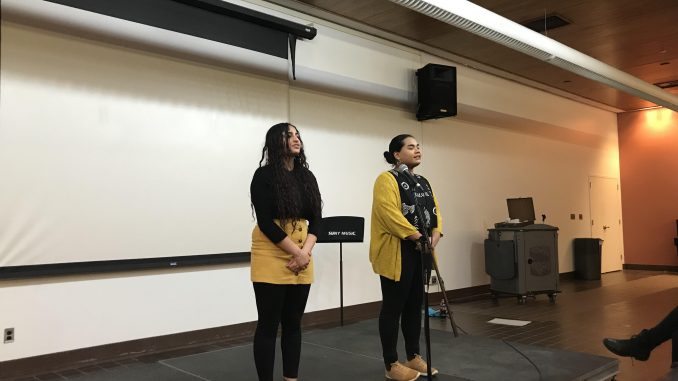
Hanna Da’Mes, Staff Writer |
On April 11, SUNY Oneonta’s Poetry Slam Association (PSA) hosted the annual “Glitterbox Slam,” following the College Unions Poetry Slam Invitational (CUPSI) Team’s trip to Philadelphia the week before.
The host for the night, Chandler Aldrich, wore a green blazer and bowtie. He began the evening by explaining what was to come. The “glitterbox” includes prompt submissions from anyone; these prompts include grocery lists, receipts, song lyrics, essays, or flyers, and everything in between. Each person who goes up to the stage has to pick out a random submission, read it over for four seconds, and then perform it as if it were a slam poem. Aldrich then announced that the night’s slam would feature the CUPSI team. The team would begin the night with poems they had performed at the competition in Pennsylvania.
First up was Katie Hebert, who had been on the CUPSI team as an alternate poet. She performed a poem that made allusions to the Greek mythological figure of Medea, using metaphors to parallel her own experience: “Having light in her bloodline but consumed by darkness/Medea asks, “What do I gain from being alive?”/And I wish I could give her an answer/but I am wondering the same thing.”
The next piece was performed by the entire team: Gabriel Membreno, Denny Burhan, Chandler Aldrich, Malack Al-Haraizeh, and Gwyn Quagliana. The poem started with Gabe, who stood up from within the audience. The rest of the team stood one by one as they contributed to the poem. From the depths of the audience, they all quartered in towards Gabe, who was in the general middle, forming somewhat of a half-circle around him. The others played parts of Gabe’s inner anxieties and identities; they verbally attack him with the line “Who are you without me?” said in unison, until he finds the courage to shoot back, “I am what I wrote of me.”
Malack and Denny performed the next poem, semi-matching in their respective yellow and denim clothing. Their poem was a letter to their fathers, or “Baba,” a Middle Eastern term of endearment for a father figure. It detailed a college student’s shift away from the principles of Islam and her apology to her father as a result. The poem mixed the narrator’s feelings of shame with resentment, of her desire for her father’s support expressing, “Instead of me, you held the Quran.”
Malack’s succeeding poem chronicled the life of a Muslim girl in school and in society after the 9/11 attacks: “September 11 may have happened once, but for some of us September 12 is every day.” Denny then came in with her own poem, which used her memories of her father making ramen soup as an extended metaphor for the night she lost her virginity. The poem interchangeably used her personalized process of making ramen to her experience of having sex with a boy who had just learned that she was a transgender woman. “I love that you can’t get pregnant,” Burhan recounted him saying in her poem.
The last of the solo performances, Chandler entered the stage to recite his poem on drug addiction. He humbly described the influence he has had over his nieces who are unfortunately affected by their father’s addiction.
To lighten the mood, Chandler then segued into the “glitterbox” portion of the slam. First up was Spencer, who read an essay about the center of the Earth. Despite the essay being incredibly long and decidedly difficult to “slam,” members of the audience encouraged Spencer by shouting the typical slam poetry-related phrases, “Remember why you wrote it,” and “Go in poet.” Malack returned to the stage to recite Rebecca Black’s one hit wonder, “Friday,” and ended the song by comedically fake crying. Princeton was unfortunate enough to receive a prompt written in German, but managed to make it through. Briana Powers and Kyle Roth, never-before-slammers, recited Ally and Aj’s “Potential Breakup Song,” which received many laughs and appreciative applauses from the audience. Emily Houten read a Naruto Run flyer, Katie Hebert slammed a dessert recipe, and Alice mastered the entire Pokemon theme song.
Gwyn Quagliana and Jillian Moczara ended the night with a brutally honest poem about the perception of those who would be considered “manic pixie girls,” and the harmful effects that the stigmatization and simplification of “alternative” girls can have on their own wellbeing. The slam overall was an obvious success; the audience was thoroughly energetic, and it was certainly clear that the poets did, in fact, “remember why they wrote it.”


Leave a Reply